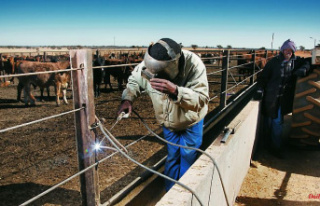Energy crisis and inflation, plus poor craftsmanship by the federal government and even worse communication of what has been decided: In this situation, the AfD can be successful even without a concept.
The party of pessimists and Putin friends is celebrating a solid comeback in Lower Saxony. Where it was always fairly weak, the AfD now achieves well over ten percent of the vote and almost doubles. Not only from the point of view of the federal government, this bodes ill for the winter. The AfD paints the country's future bleaker than any other party. And with that, it has a following.
For more than two years, the AfD was unable to capitalize on the fear of Corona or the anger about tough restrictions. Six to twelve months ago it seemed finally reduced to an East party in competition with the Left Party - and close to insignificance in West Germany. The resurrection in the nationwide surveys and now in Lower Saxony succeeded in less than three summer months: Rarely have the stars all been so favorable for the AfD at once.
The number of refugees is as large as it was at the peak of 2015/16. Most of them come from Ukraine, fleeing the war. The first gyms will be closed.
After the start of the war, the prices for food, heating and transport exploded in a way that only 70-year-olds know from their own adult experience. Concerns are also spreading in the middle class that are otherwise unknown there: that at the end of the month there is simply not enough money and you have to use your savings. As long as you have some.
As a result, people in Germany are more pessimistic about their own future and that of their country than they have been for decades. And a growing number seem more receptive than usual to the simple answers: that all it takes is the war to end for everything to go back to normal and your old life back. Or: that the Ukraine should give up a fifth of its territory and that Germany only has to stay out of the war so that the cheap gas can flow again and the fuel costs 1.50 euros.
In addition, there is the latent anti-Americanism in Germany and the notorious love of Russia, especially in East Germany. All in all, the AfD can take advantage of all these worries and tendencies. It doesn't need a coherent, realistic program, its own solutions, or even just a moral backbone.
The AfD is the clinical thermometer of dissatisfaction and fear. On the one hand, the large diffuse anger about the whole misery landed on the ballot paper in Lower Saxony - and a receipt for poor craftsmanship by the federal government, even worse communication of the decision-makers and lack of leadership by the Federal Chancellor. It lacks both clarity and warmth.
Prime Minister Stephan Weil was able to keep the SPD from falling with his popularity and notoriety; Since the summer, the Greens have been tracing the decline of their top staff, especially that of Economics Minister Robert Habeck. And the FDP is being badly plucked because it doesn't make its own clientele happy in the federal government and makes the others angry. Red-Green can take over in Hanover. The FDP alone pays the bill for the federal government. This will shake the traffic light.
The Lower Saxony elections were far more dominated by war and crisis than by purely state issues. It was a federal election on a small scale. Unfortunately, Vladimir Putin did pretty well with the AfD, which runs the Kremlin's business.












